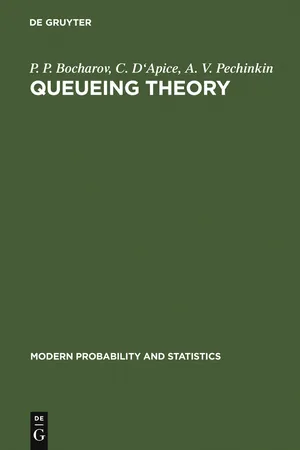
- 460 pages
- English
- PDF
- Available on iOS & Android
eBook - PDF
Queueing Theory
About this book
No detailed description available for "Queueing Theory".
Tools to learn more effectively

Saving Books

Keyword Search

Annotating Text

Listen to it instead
Information
Table of contents
- Foreword
- Introduction
- 1 Probabilistic apparatus of the queueing theory
- 1.1 Characteristic transformations
- 1.2 Exponential and Poisson distributions
- 1.3 Renewal processes. Regenerative processes
- 1.4 Markov chains
- 1.5 Markov processes with discrete state set
- 1.6 Semi-Markov, linearwise, and piecewise-linear processes
- 1.7 Kronecker matrix product
- 2 Defining parameters of queueing systems
- 2.1 Input flow
- 2.2 System structure
- 2.3 Customer service times
- 2.4 Service discipline
- 2.5 Performance indices of a queueing system
- 2.6 Classification of queueing systems
- 2.7 Queueing networks
- 2.8 Properties of distributions for some types of recurrent input flows and service times
- 3 Elementary Markov models
- 3.1 M/M/l/∞ system
- 3.2 M/M/n/r system
- 3.3 M/M/l/∞ system with ‘impatient’ customers
- 3.4 System with a finite number of sources
- 3.5 M[X]/M/l/∞ system with batch arrivals
- 3.6 M/Em/l/∞ system
- 3.7 M/M/l/0 system with retrial queue
- 4 Markov systems: algorithmic methods of analysis
- 4.1 M/Hm/l/r and Hl/M/l/r systems
- 4.2 M2/M/n/r system with non-preemptive priority
- 4.3 M/PH/l/r and PH/M/l/r systems
- 4.4 M/PH/l/r system with server vacations and flow dependent on the queue state
- 4.5 PH/PH/l/r system
- 4.6 Markov systems described by generalised birth-and-death process
- 5 M/G/l/∞ system: investigation methods
- 5.1 Embedded Markov chain
- 5.2 Virtual waiting time
- 5.3 Residual service time
- 5.4 Elapsed waiting time
- 5.5 Use of renewal processes
- 6 Other simple non-Markov models
- 6.1 M/G/∞ system
- 6.2 G/G/∞ system
- 6.3 M/D/n/∞ system
- 6.4 G/M/l/∞ system
- 6.5 M/G/l/r system
- 6.6 M/G/n/0 system
- 7 MAP/G/l/r system
- 7.1 Embedded Markov chain: FCFS discipline
- 7.2 Supplementary variables: FCFS discipline
- 7.3 LCFS discipline
- 7.4 Matrix exponential moments
- 8 MAP/G/l/∞ system
- 8.1 Embedded Markov chain
- 8.2 Virtual waiting time
- 8.3 Supplementary variables: FCFS discipline
- 8.4 LCFS discipline
- 9 MAP/G/l/r system: generalisation
- 9.1 BMAP/SM/l/r system
- 9.2 MAP/G2/l/r system with preemptive priority
- 9.3 MAP/G2/l/r system with non-preemptive priority
- 9.4 MAP/G/l/r retrial system
- 9.5 MAP/G/l/∞ system withforeground-background processor sharing discipline
- 9.6 MAP/G/l/r system with LCFS discipline and bounded total volume of customers
- 9.7 G/MSP/l/r system
- 10 Queueing networks
- 10.1 Network classes
- 10.2 Open exponential networks
- 10.3 Closed exponential networks
- Bibliography
- Index
Frequently asked questions
Yes, you can cancel anytime from the Subscription tab in your account settings on the Perlego website. Your subscription will stay active until the end of your current billing period. Learn how to cancel your subscription
No, books cannot be downloaded as external files, such as PDFs, for use outside of Perlego. However, you can download books within the Perlego app for offline reading on mobile or tablet. Learn how to download books offline
Perlego offers two plans: Essential and Complete
- Essential is ideal for learners and professionals who enjoy exploring a wide range of subjects. Access the Essential Library with 800,000+ trusted titles and best-sellers across business, personal growth, and the humanities. Includes unlimited reading time and Standard Read Aloud voice.
- Complete: Perfect for advanced learners and researchers needing full, unrestricted access. Unlock 1.4M+ books across hundreds of subjects, including academic and specialized titles. The Complete Plan also includes advanced features like Premium Read Aloud and Research Assistant.
We are an online textbook subscription service, where you can get access to an entire online library for less than the price of a single book per month. With over 1 million books across 990+ topics, we’ve got you covered! Learn about our mission
Look out for the read-aloud symbol on your next book to see if you can listen to it. The read-aloud tool reads text aloud for you, highlighting the text as it is being read. You can pause it, speed it up and slow it down. Learn more about Read Aloud
Yes! You can use the Perlego app on both iOS and Android devices to read anytime, anywhere — even offline. Perfect for commutes or when you’re on the go.
Please note we cannot support devices running on iOS 13 and Android 7 or earlier. Learn more about using the app
Please note we cannot support devices running on iOS 13 and Android 7 or earlier. Learn more about using the app
Yes, you can access Queueing Theory by P. P. Bocharov,C. D'Apice,A. V. Pechinkin in PDF and/or ePUB format, as well as other popular books in Mathematics & Mathematics General. We have over one million books available in our catalogue for you to explore.